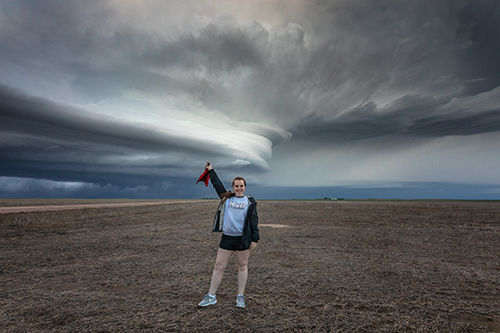Biology
White Squirrel Weather Provides Immeasurable Experience
- Aurelia Spaulding
- Thursday, September 5th, 2019

“The opportunity it has given me and so many other students in the program is just immeasurable,” said Olivia Cahill, White Squirrel Weather (WSWX) lead forecaster and WKU senior from Dry Ridge, studying meteorology.
White Squirrel Weather at WKU offers a unique program that impacts how students learn meteorology and emergency management. At the same time, students, like Cahill, participate in applied learning that impacts the communities they serve. White Squirrel Weather provides real-time observations and forecast weather content to the WKU campus and community for the purposes of hazards mitigation, and emergency preparedness and management.
In the last year, White Squirrel Weather created and launched a mobile classroom / mobile forecast lab that debuted at the Cage the Elephant concert in September. “Students were able to help provide real time forecasts and emergency management services for the event that carried over to the football game. There was a tornado threat that day and we were able to provide assistance,” said Dr. Joshua Durkee, WKU’s University Meteorologist and Associate Professor in the Meteorology Program.
The students participate in applied research and service-learning by running every aspect of WSWX from the data collection to forecast and broadcasting. They work with the Winter Weather Advisory Board to help with decisions about school closings. In addition, at least two students work in the Emergency Operations Center at athletic events to provide weather intelligence during the games.
“White Squirrel Weather allows us to take our forecasting abilities outside of the classroom and apply them to real clients who need our expertise to make important decisions,” Cahill said. “With White Squirrel Weather, I am able to take all the techniques and skills that I have learned from my professors and create my own forecasts to send to university officials, or high schools, or sporting teams around the area and they use our information to make decisions for people who work with them.”
Photo Credit: Dr. Josh Durkee
Some of the links on this page may require additional software to view.

